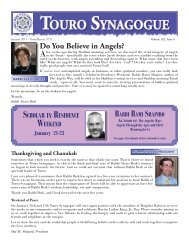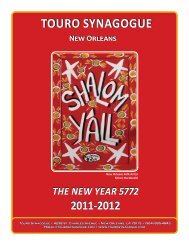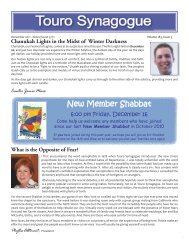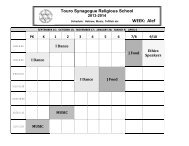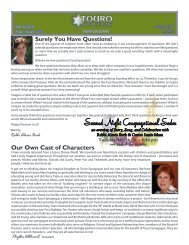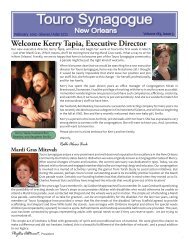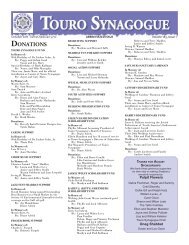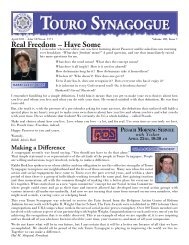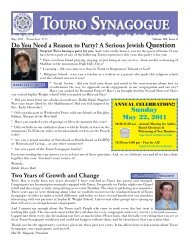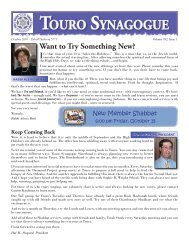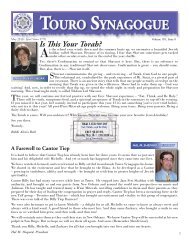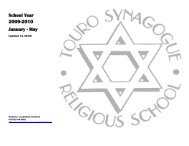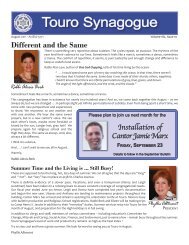Reform Judaism for Teachers module - Touro Synagogue
Reform Judaism for Teachers module - Touro Synagogue
Reform Judaism for Teachers module - Touro Synagogue
Create successful ePaper yourself
Turn your PDF publications into a flip-book with our unique Google optimized e-Paper software.
people.<br />
Since Emancipation, Jews have faced the problem of mixed marriage and the status of the offspring of mixed marriage. The<br />
<strong>Re<strong>for</strong>m</strong> Movement responded to the issue. In 1947 the CCAR adopted a proposal made by the Committee on Mixed Marriage<br />
and Intermarriage:<br />
With regard to infants, the declaration of the parents to raise them as Jews shall be deemed sufficient <strong>for</strong> conversion. This<br />
could apply, <strong>for</strong> example, to adopted children. This decision is in line with the traditional procedure in which, according to the<br />
Talmud, the parents bring young children (the Talmud speaks of children earlier than the age of three) to be converted, and the<br />
Talmud comments that although an infant cannot give its consent, it is permissible to benefit somebody without his consent (or<br />
presence). On the same page the Talmud also speaks of a father bringing his children <strong>for</strong> conversion, and says that the<br />
children will be satisfied with the action of their father. If the parents there<strong>for</strong>e will make a declaration to the rabbi that it is their<br />
intention to raise the child as a Jew, the child may, <strong>for</strong> the sake of impressive <strong>for</strong>mality, be recorded in the Cradle-Roll of the<br />
religious school and thus be considered converted.<br />
Children of religious school age should likewise not be required to undergo a special ceremony of conversion but should<br />
receive instruction as regular students in the school. The ceremony of Confirmation at the end of the school course shall be<br />
considered in lieu of a conversion ceremony.<br />
Children older than confirmation age should not be converted without their own consent. The Talmudic law likewise gives the<br />
child who is converted in infancy by the court the right to reject the conversion when it becomes of religious age. There<strong>for</strong>e the<br />
child above religious school age, if he or she consents sincerely to conversion, should receive regular instruction <strong>for</strong> that<br />
purpose and be converted in the regular conversion ceremony. (CCAR Yearbook, Vol. 57)<br />
This issue was again addressed in the 1961 edition of the Rabbi's Manual:<br />
Jewish law recognizes a person as Jewish if his mother was Jewish, even though the father was not a Jew. One born of such<br />
mixed parentage may be admitted to membership in the synagogue and enter into a marital relationship with a Jew, provided<br />
he has not been reared in or <strong>for</strong>mally admitted into some other faith. The child of a Jewish father and a non- Jewish mother,<br />
according to traditional law, is a Gentile; such a person would have to be <strong>for</strong>mally converted in order to marry a Jew or become<br />
a synagogue member.<br />
<strong>Re<strong>for</strong>m</strong> <strong>Judaism</strong>, however, accepts such a child as Jewish without a <strong>for</strong>mal conversion, if he attends a Jewish school and<br />
follows a course of studies leading to Confirmation. Such procedure is regarded as sufficient evidence that the parents and the<br />
child himself intend that he shall live as a Jew. (Rabbi's Manual, p. 112)<br />
We face today an unprecedented situation due to the changed conditions in which decisions concerning the status of the child<br />
of a mixed marriage are to be made.<br />
There are tens of thousands of mixed marriages. In a vast majority of these cases the non-Jewish extended family is a<br />
functioning part of the child's world, and may be decisive in shaping the life of the child. It can no longer be assumed a priori,<br />
there<strong>for</strong>e, that the child of a Jewish mother will be Jewish any more than that the child of a non-Jewish mother will not be.<br />
This leads us to the conclusion that the same requirements must be applied to establish the status of a child of a mixed<br />
marriage, regardless of whether the mother or the father is Jewish.<br />
There<strong>for</strong>e:<br />
The Central Conference of American Rabbis declares that the child of one Jewish parent is under the presumption of Jewish<br />
descent. This presumption of the Jewish status of the offspring of any mixed marriage is to be established through appropriate<br />
and timely public and <strong>for</strong>mal acts of identification with the Jewish faith and people. The per<strong>for</strong>mance of these mitzvot serves to<br />
commit those who participate in them, both parent and child, to Jewish life.<br />
Depending on circumstances, 1 mitzvot leading toward a positive and exclusive Jewish identity will include entry into the<br />
Union <strong>for</strong> <strong>Re<strong>for</strong>m</strong> <strong>Judaism</strong>-Department of Lifelong Jewish Learning<br />
51



